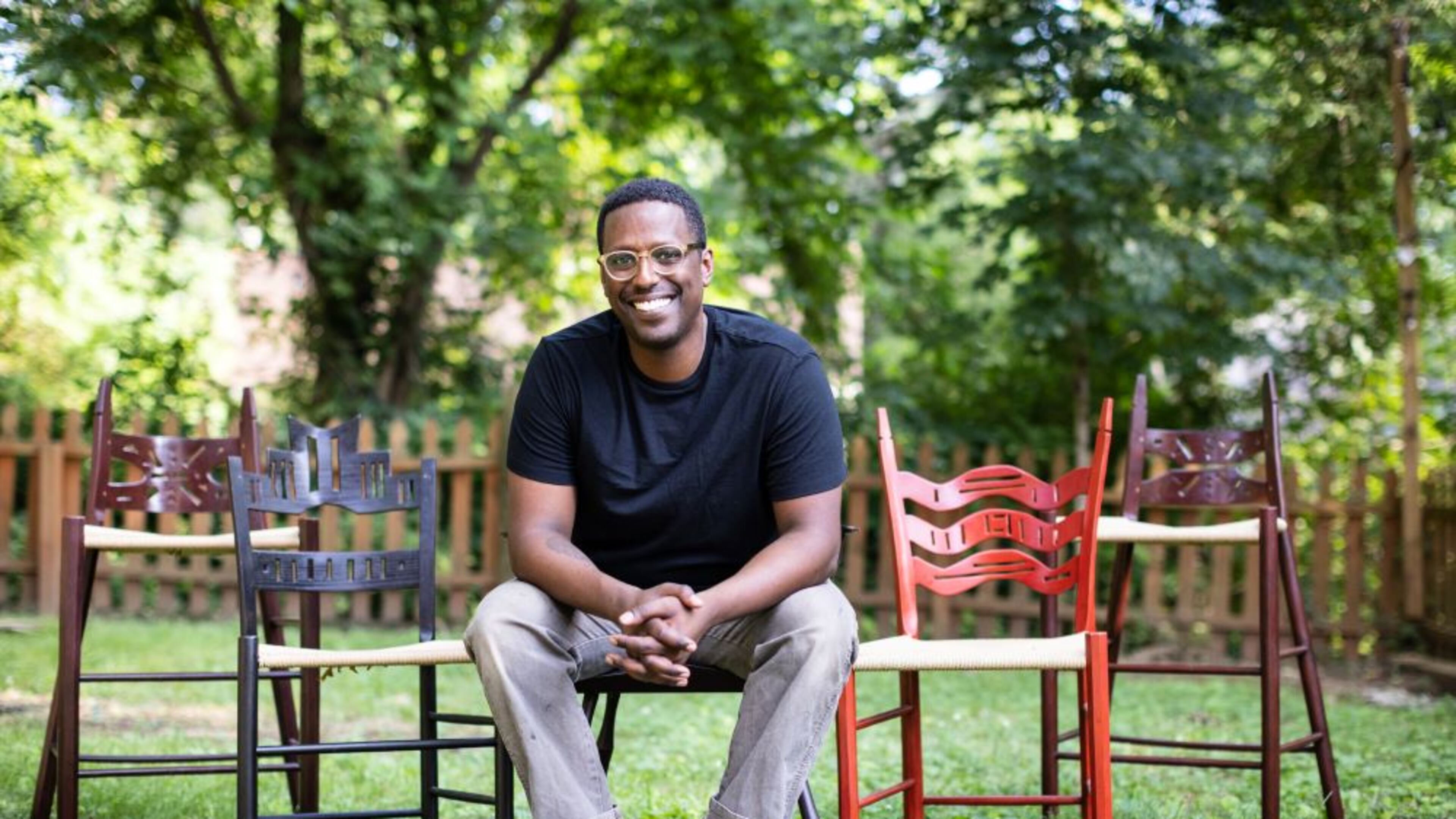New book honors historical contributions of unsung Black craftspeople

Building and designing furniture by hand is how Atlanta-based woodworker Robell Awake acknowledges and preserves the work and legacy of pioneering Black artisans. It is work that often goes uncredited.
The craftsman makes sturdy ladder-back chairs through green woodworking, a technique that carves out furniture from a log. Its seats are finely woven, and the two horizontal bars that connect the two poles have geometric shapes etched across them — a design usually found on Jimma chairs, a style of furniture that originated in Ethiopia.
He told UATL making furniture is how he stays connected to his ethnic and cultural origins. “It’s my way of adding my Black identity being a first generation Ethiopian American and infusing it with Black culture here,” Awake said.
Awake is determined to remind audiences where basic furnishings and creations came from. “A Short History of Black Craft in Ten Objects,” his first book, published by Princeton Architectural Press and released today. The book revives and uncovers the stories of 10 Black trailblazers who specialized in blacksmithing, architecture, sweetgrass basket weaving and other decorative arts.
Awake was inspired by Richard “Dick” Poynor, an enslaved chairmaker who lived in Tennessee in the 19th century, whose story he shares in the book.
“I don’t want handwork to be demeaned, because throughout history, being a blacksmith, carpenter or brick mason were some of the most respected and lucrative careers to have. But now, the way America works, that narrative is getting lost and we’re getting divorced from our hands in this modern world.”

The book features stories and sketches of innovators who survived racial and sexual discrimination, and whose names were mostly unmentioned in media. These include Ann Lowe, the seamstress who designed Jacqueline Kennedy Onassis’s wedding gown in 1953. Also featured is Harriet Powers, a Georgia-based folk artist and quiltmaker who stitched the 1833 Leonid meteor shower on her 1898 creation “Pictorial Quilt.”
Tonight, Awake will participate in a live discussion of the new book at Auburn Avenue Research Library. Monica Obniski, the High Museum of Art’s curator of decorative arts and design, is the event’s moderator.
Obniski said she appreciates how Awake’s work revives and celebrates the past. “It’s a beautifully illustrated, accessible and digestible history of Black craftspeople, and Robell’s creative practice is anchored in a deep interest in historical Black craft while he reimagines new fantastical forms in furniture,” she said.
Awake’s parents, who immigrated from Ethiopia in the 1970s, moved him to Marietta from Boston in 1987. A self-taught furniture maker, his only formal training was a two-week workshop at North Bennet Street School in Boston in 2016.
He spent a year assisting Atlanta-based furniture maker Kendrick Anderson with his projects, and fine-tuned his craft watching YouTube tutorials and working on home construction sites. He said the experience gave him the confidence to turn his chairmaking passion into a profession.
“I realized from framing, hanging doors and welding that I could do this for a living,” Awake said, “but I wanted to make furniture that feels more like me.”

Like a true analog enthusiast, Awake hopes his book encourages people to unplug from electronic devices often to create things manually.
“We have to tap back into the human impulse to make things, because it’s the antidote to the alienation of technology,” he told UATL.
These days, when he’s not working out of a Southwest Atlanta studio near West End MARTA station, Awake is traveling across the country to schools and museums, leading workshops on designing and building furniture. He also searches for more Black craft history, which he said fuels his creativity.
“Finding and telling these stories makes me want to hit the studio and translate all of these ideas into an object,” Awake said.
6:30-7:30 p.m. Auburn Avenue Research Library, 101 Auburn Avenue NE, Atlanta. 404-613-4001. eventbrite.com
Become a member of UATL for more stories like this in our free newsletter and other membership benefits.
Follow UATL on Facebook, on X, TikTok and Instagram.


